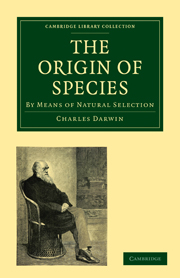 The Origin of Species
The Origin of Species Book contents
- Frontmatter
- Contents
- INSTRUCTION TO BINDER
- ADDITIONS AND CORRECTIONS, TO THE SIXTH EDITION
- HISTORICAL SKETCH
- INTRODUCTION
- CHAPTER I VARIATION UNDER DOMESTICATION
- CHAPTER II VARIATION UNDER NATURE
- CHAPTER III STRUGGLE FOR EXISTENCE
- CHAPTER IV NATURAL SELECTION; OR THE SURVIVAL OF THE FITTEST
- CHAPTER V LAWS OF VARIATION
- CHAPTER VI DIFFICULTIES OF THE THEORY
- CHAPTER VII MISCELLANEOUS OBJECTIONS TO THE THEORY OF NATURAL SELECTION
- CHAPTER VIII INSTINCT
- CHAPTER IX HYBRIDISM
- CHAPTER X ON THE IMPERFECTION OF THE GEOLOGICAL RECORD
- CHAPTER XI ON THE GEOLOGICAL SUCCESSION OF ORGANIC BEINGS
- CHAPTER XII GEOGRAPHICAL DISTRIBUTION
- CHAPTER XIII GEOGRAPHICAL DISTRIBUTION—continued
- CHAPTER XIV MUTUAL AFFINITIES OF ORGANIC BEINGS: MORPHOLOGY: EMBRYOLOGY: RUDIMENTARY ORGANS
- CHAPTER XV RECAPITULATION AND CONCLUSION
- GLOSSARY OF SCIENTIFIC TERMS
- INDEX
- Plate section
CHAPTER X - ON THE IMPERFECTION OF THE GEOLOGICAL RECORD
Published online by Cambridge University Press: 29 August 2010
- Frontmatter
- Contents
- INSTRUCTION TO BINDER
- ADDITIONS AND CORRECTIONS, TO THE SIXTH EDITION
- HISTORICAL SKETCH
- INTRODUCTION
- CHAPTER I VARIATION UNDER DOMESTICATION
- CHAPTER II VARIATION UNDER NATURE
- CHAPTER III STRUGGLE FOR EXISTENCE
- CHAPTER IV NATURAL SELECTION; OR THE SURVIVAL OF THE FITTEST
- CHAPTER V LAWS OF VARIATION
- CHAPTER VI DIFFICULTIES OF THE THEORY
- CHAPTER VII MISCELLANEOUS OBJECTIONS TO THE THEORY OF NATURAL SELECTION
- CHAPTER VIII INSTINCT
- CHAPTER IX HYBRIDISM
- CHAPTER X ON THE IMPERFECTION OF THE GEOLOGICAL RECORD
- CHAPTER XI ON THE GEOLOGICAL SUCCESSION OF ORGANIC BEINGS
- CHAPTER XII GEOGRAPHICAL DISTRIBUTION
- CHAPTER XIII GEOGRAPHICAL DISTRIBUTION—continued
- CHAPTER XIV MUTUAL AFFINITIES OF ORGANIC BEINGS: MORPHOLOGY: EMBRYOLOGY: RUDIMENTARY ORGANS
- CHAPTER XV RECAPITULATION AND CONCLUSION
- GLOSSARY OF SCIENTIFIC TERMS
- INDEX
- Plate section
Summary
In the sixth chapter I enumerated the chief objections which might be justly urged against the views maintained in this volume. Most of them have now been discussed. One, namely the distinctness of specific forms, and their not being blended together by innumerable transitional links, is a very obvious difficulty. I assigned reasons why such links do not commonly occur at the present day under the circumstances apparently most favourable for their presence, namely on an extensive and continuous area with graduated physical conditions. I endeavoured to show, that the life of each species depends in a more important manner on the presence of other already defined organic forms, than on climate; and, therefore, that the really governing conditions of life do not graduate away quite insensibly like heat or moisture. I endeavoured, also, to show that intermediate varieties, from existing in lesser numbers than the forms which they connect, will generally be beaten out and exterminated during the course of further modification and improvement. The main cause, however, of innumerable intermediate links not now occurring everywhere throughout nature, depends on the very process of natural selection, through which new varieties continually take the places of and supplant their parent-forms. But just in proportion as this process of extermination has acted on an enormous scale, so must the number of intermediate varieties, which have formerly existed, be truly enormous.
- Type
- Chapter
- Information
- The Origin of SpeciesBy Means of Natural Selection, or the Preservation of Favoured Races in the Struggle for Life, pp. 264 - 289Publisher: Cambridge University PressPrint publication year: 2009First published in: 1859


